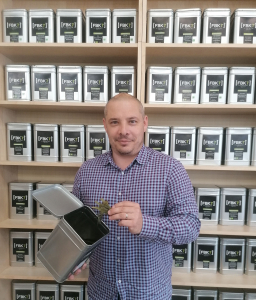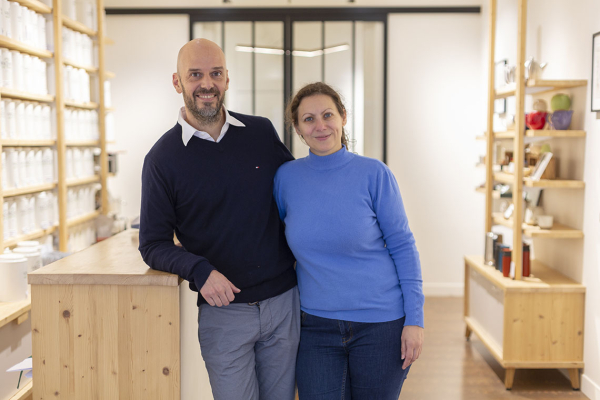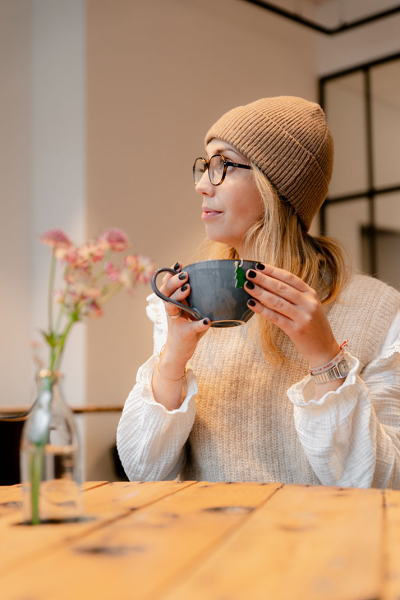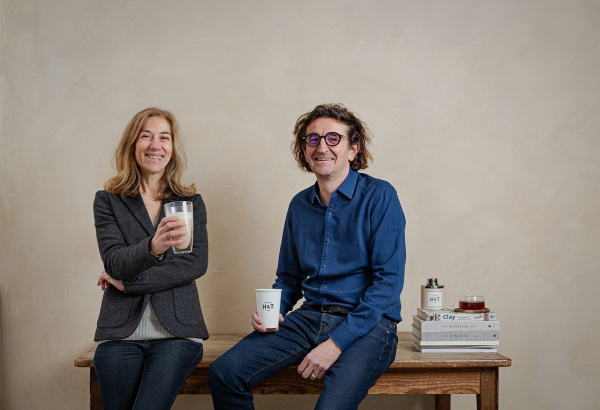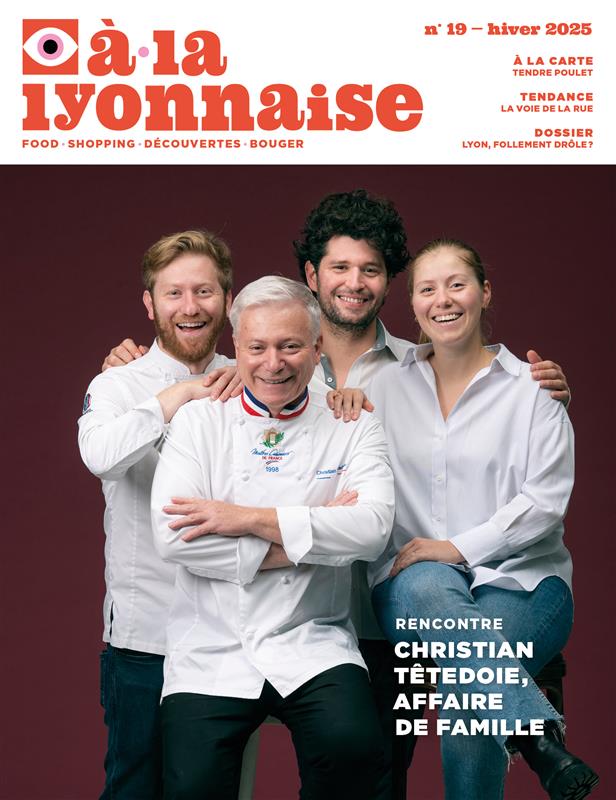Who's for tea in Lyon ?

A beverage that offers many benefits, tea is gradually winning over new converts, attracting a younger crowd and many epicureans who enjoy it hot or cold, savouring the aromatic notes as they would with a glass of wine.
By Véronique Lopes.
Traditionally drunk at breakfast and teatime, tea can now be found at cocktail receptions and dinners. Several bigname chefs have even turned to “tea sommeliers” to create pairings with their dishes. Could tea take the spotlight away from wine? It’s possible. Even the prestigious French award ‘Meilleur Ouvrier de France’ has a tea tasting category, for which Valérie and Jean-Claude Collet, the new owners of the Lyonnais tea house Cha Yuan, have provided various samples. “Two years ago, candidates were required to know how to serve tea, describe it and recognise its varieties,” explained Valérie, who has been approached by several Michelin-starred establishments, such as Saisons in Écully, La Mère Brazier in Lyon, and Yoann Conte’s La Maison Bleue in Annecy, to find food and tea pairings.
Putting the ‘tea’ in ‘star’
The Lyon-based chef Alain Alexanian, a tireless advocate for a more virtuous, plant-based approach to catering, has long been a proponent of marrying the subtle notes of tea with dishes. As chef of the restaurant L’Alexandrin, holder of a Michelin star from 1991 to 2007, he noticed that his fellow chefs were unfamiliar with the world of tea. “Either they didn’t offer any at all, or the tea on offer came in tea bags,” recalled the chef with the trademark orange jacket. So he got to work putting together a selection of teas to present to other restaurants. Next, he even developed his own range, grinding the peppers, selecting the flowers and fruits… And so ‘Kamelya’ was born in 2010. This selection of world teas also includes twenty or so “designer teas” dreamed up by the chef. In his words, “their taste is equalled only by their visual beauty.” He has also turned his hand to the creation of herbal teas: “because they are a reflection of a terroir and a region.”
"There is a tea out there for each one of us"
Refining your palate
On closer inspection, it seems that it is above all unfamiliarity that has kept tea in the shadows for so long. While there are no courses dedicated to tea available in France, for the moment, hospitality and catering schools are taking notice. In Lyon, Institut Lyfe (formerly known as ‘Institut Paul Bocuse’) offers its students tasting classes and even an optional module. From 2016 to 2021, these sessions were run by a young tea entrepreneur: Julien David, founder of the Loire-based brand ‘FBKT - La Fabrikathé’. He introduced students to the aromas, notes and possible pairings of tea, showing them how to serve it and bring out its full potential. He is joined on this mission by Camille Lelaurin,
who has been a master tea sommelier at Palais des Thés for five years. She teaches there enthusiasts the techniques involved in quality tea service. This young 33-year-old will actually be
judging the art of service at the next “sobrellerie” [Translator’s note: the profession of a sommelier but with non-alcoholic drinks] examination to be held at Institut Lyfe.
Some cheese with your tea?
Recognising teas in order to find the perfect pairing is also the job of Florian Aumaire, founder of Les Thés sur Terre, in the Ainay neighbourhood of Lyon’s 2nd district. He began organising tea and cheese tastings right from the opening of his shop. It may raise a few eyebrows, but it has been a big hit. “Our shop hasn’t gone down the traditional path for tea. My aim is to talk about it like wine, with all its complexity, its terroir, the producer’s history, and so on… In my view, we need to make tea our own, with a more western approach,” Florian told us. As a guest jury member in Asia, his approach and his palate have opened the doors to some little-known, smallscale producers, who supply him with rare fine teas. What you won’t find in his shop, however, are teas with cake or red fruit flavours: “If it’s not
something that can be created naturally, then I won’t stock it.”
And now we come to the crux of it: the pleasure to be had in savouring this precious beverage, with its oftignored complexity, its relationship to ritualised time, and the luxury that it represents. “Tea is a noble product; it has a cost and it’s not that easy to source. You need to take the time to smell and taste it, and then gradually create your own library of flavours,” Camille Lelaurin added. This is a vision shared by Nathalie Cotte, head of the young Lyon-based brand Human & Tea: “there is a tea out there for each one of us.” All you need to do is find it.
Three questions to Julien David
JULIEN AND HIS WIFE NATASHA ARE CO-FOUNDERS OF THE BRAND FBKT - LA FABRIKATHÉ. THEY EVEN GROW THEIR OWN TEA PLANTS IN THE LOIRE!
Tea travels a long way to reach France. Was that the motivation for creating your own botanical garden?
Since the beginning of La Fabrikathé, we’ve imported our
tea directly from all producing countries, including Japan,
India, China, Vietnam, Thailand, Mozambique, Taiwan and
Korea. In 2020, we were lucky enough to have placed our
orders two weeks before Covid and the border closures.
That gave us the idea of trying to grow tea plants here, in
the Loire, next to our warehouse. We bought a piece of
farmland and the adventure started.
How about the difference in climate between France and Asia?
We went looking for tea plants in the mountains of Turkey, where the climate is practically the same as ours. We acclimatised them on the shores of Lake Maggiore, in Italy, and then we planted them here. Today, we have 1,600 tea plants, 450 of which we reproduced from seeds. We’ve had a few setbacks, but we’ve started to get our first harvests. We need 7,000 tea plants, or one hectare (two and a half acres), to produce 50 kg of dried tea leaves. Given that we sell a couple of dozen tons of teas and herbal teas each year, our own production is hardly worth mentioning.
But could the future of tea be local?
We still have lots of things to learn, in terms of growing the plants and drying the leaves for example. The first experiments have been rather promising. We’re also growing a dozen plant varieties for our herbal teas. Each year, we harvest between 300 and 400 kg of medicinal and aromatic plants. This allows us to be self-sufficient for 20% of our needs. For the tea, we’ll have to wait, but there are already twenty or so tea plantation projects in France, mainly along the Atlantic Coast. Who knows... maybe we’ll become a tea-producing country one day.
La Fabrikathé15 rue de la Charité, Lyon 2ème
Web site
Portraits
Florian Aumaire, creator of pairings
For Florian Aumaire, tea needs to be presented like wine, including its complexity, its terroir, its variety, the history of its producer, and its gastronomic approach. “We need to approach tea in a more western way, and come up with tea and food pairings,” explained the winner of the 2018 Tea Masters Cup in France, and member of the jury at international level. Since leaving Palais des Thés and opening his shop, Les Thés sur Terre, in Lyon’s 2nd district, Florian has constantly sought to pair tea’s subtle flavours with gastronomy. First at Les Éclaireurs, where his teas are used as ingredients in the eclairs. Then at Maison Pignol, for which he selected a jasmine tea that is used to make their Valentine’s cake. He has since created tea menus for both establishments, and also supplies coffee shops (such as Mokxa, Fika, Mill Factory, Caillou and Magma) and restaurants (Milpré, Prairial*). Honoured to have such prestigious partners, Florian and Sophie remain grounded and continue to
share their passion for teas. Supported by Sophie, he organises twice-weekly tastings that pair tea
with cheese, chocolate and other products from neighbouring shops.
47 rue Franklin, Lyon 2ème
Web site
Élodie Fagot, hand-sewed tea
“I didn’t discover tea; tea discovered me,” quipped Elodie Fagot. She’s been running her own business – Tea Heritage – for two years now. In 2024, she achieved the milestone of selling more than two million tea bags globally. This success story still surprises her. As a child, she didn’t particularly enjoy the teatime she had to endure every afternoon; but one fateful day, she made a heartshaped teabag with a coffee filter as a Valentine’s Day gift. After posting her creation on Instagram, the requests started pouring in, encouraging her to timidly open a shop on Etsy. “My first customer was from Manchester. I told myself that if people from England wanted to buy my tea, it was a
good omen.” Today, Elodie has more than twenty organic tea and herbal tea recipes, all sourced fairly, and thirty or so bag designs, made with nonwoven organic cotton: cloud, squirrel, cat’s head,
star, moon, Eiffel Tower… Most of her creations are now sold on the east coast of the United States.
This thirty-something isn’t planning to stop there; she has now set her sights on Italy, a country that is obsessed with coffee but offers plenty of potential for tea.
Web site
Nathalie et Daniel Cotte, taste for travel
Their career has taken them around the globe, but it was their desire to start a business
and their love for tea that brought Nathalie and Daniel Cotte to Lyon. “For a project aimed
at awakening the senses, and taste in particular, it just had to be the world capital of
gastronomy,” stated Nathalie, co-founder of the Human & Tea brand created in 2016. They
now have two shops in Lyon and one in Paris. On the shelves, each tea category – green,
black, blue, orange rooibos and white – comes in a different coloured box. In total, there
are more than one hundred tea and herbal tea products, sourced from plantations in
China, India, Sri Lanka, Japan, Himalaya and Tibet. Because growing methods vary from one
country or region to the next, each variety reflects its terroir of origin, just as with fine
wine. Each cup is a journey.
11 rue des Quatre Chapeaux, Lyon 2ème
23 rue Sainte-Hélène, Lyon 2ème
Web site
